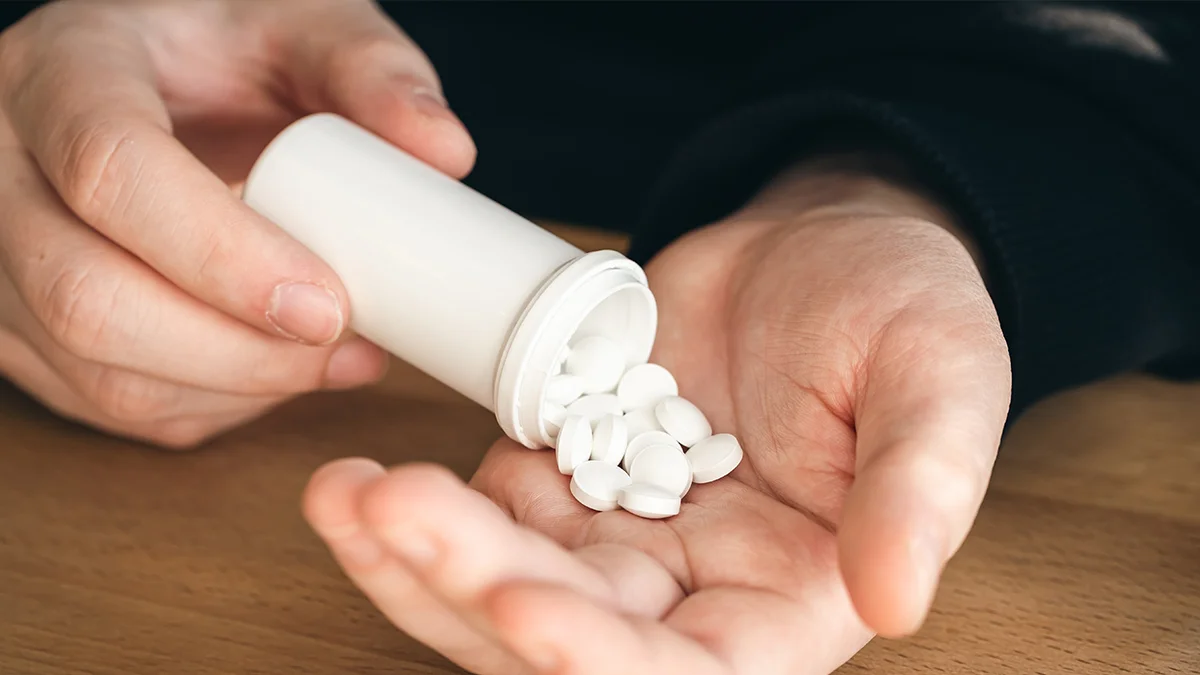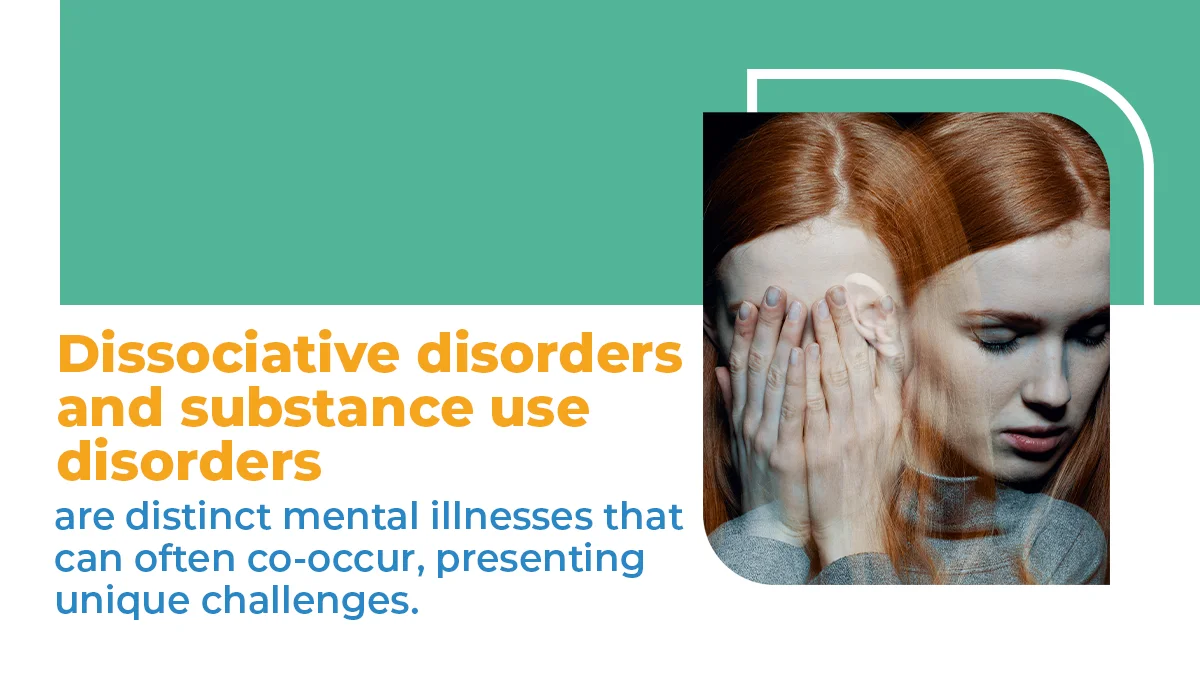
Using Tramadol To Manage Suboxone Withdrawal
Explore the role of tramadol in managing suboxone withdrawal symptoms with The Recovery Team-Newton.

Dissociative disorders and substance use disorders (SUDs) are complex mental health conditions that can significantly impact an individual’s life. While they may appear distinct at first glance, a notable overlap exists between them, often influencing the other in a complex interplay.
Continue reading as we discover the connection between dissociative disorders and substance use disorders (SUDs).
Dissociative disorders and substance use disorders are complex mental illnesses that can profoundly impact a person’s life. This article covers:
If you’re struggling with co-occurring disorders, reach out to The Recovery Team-Newton for integrated treatment. Dial (508) 978-2772 to get details of our services.
Dissociative disorders are mental health conditions where a person feels disconnected from their thoughts, feelings, memories, or even identity. These disorders can make someone feel like they’re not in control of themselves or like they’re watching their life from outside their body.
There are several types of dissociative disorders, including:
Symptoms of dissociative disorders can vary but may include memory gaps, feeling disconnected from reality, experiencing identity confusion, or feeling like you’re watching yourself from outside your body. These symptoms can disrupt everyday life and relationships, causing distress and confusion.
The effects of dissociative disorders can be profound, impacting a person’s ability to function at work, school, or in social situations. They may also lead to other mental health issues like anxiety or depression if left unaddressed. Seeking help from mental health professionals is essential for diagnosis and treatment.
Substance Use Disorders (SUDs) are conditions where a person continues to use substances like drugs or alcohol despite adverse consequences. These disorders can impact anyone, regardless of age, gender, or background. SUDs are recognized as a medical condition, not a moral failing.
Here are the common types of substance use disorders (SUDs):
Symptoms of SUDs can vary but often include things like craving the substance, needing more of it to get the same effect, and struggling to stop using it despite adverse consequences. People with SUDs may also face symptoms of withdrawal when they attempt to quit using the substance, such as nausea, sweating, or shaking.
SUDs can harm physical health by causing problems like liver damage, lung disease, or heart issues. SUDs can also lead to mental health disorders like depression or anxiety. Additionally, they can strain relationships and make it challenging to keep a job or stay in school. People with drug abuse and addiction issues must get professional help.
Dissociative disorders and substance use disorders (SUDs) frequently co-occur, meaning they often appear together in individuals. Let’s examine the various factors that contribute to their coexistence.
One reason for the link between dissociative disorders and substance use disorders is the use of substances as a coping mechanism. Individuals experiencing dissociative symptoms may turn to drugs or alcohol to alleviate distress or numb emotional pain. Substances might temporarily mask feelings of detachment or dissociation, offering a perceived escape from reality.
Another significant aspect of the relationship between dissociative disorders and substance use is self-medication. Individuals may turn to drugs or alcohol to alleviate symptoms of dissociation, such as depersonalization or derealization. They may use substances to regain a sense of control over their emotions and experiences, albeit with detrimental consequences in the long run.
A significant proportion of individuals with dissociative disorders have a history of traumatic events, such as childhood abuse or neglect. Trauma can increase the likelihood of developing both dissociative and substance use disorders. Substance use may serve as a way to cope with the distressing memories or feelings associated with past trauma, further intertwining the two conditions.
Dissociative disorders are often associated with impulsivity and risky behaviors. This impulsivity can manifest in substance use, as individuals may engage in reckless drug or alcohol use without considering the consequences. Substance use can further impair judgment and increase the likelihood of engaging in risky behaviors, perpetuating the cycle of dissociation and substance abuse.
Biological factors, such as genes and neurochemistry, play a role in both dissociative and substance use disorders. Research suggests that certain genetic predispositions may increase vulnerability to both conditions. In addition, imbalances in neurotransmitters, such as dopamine and serotonin, can contribute to the development and maintenance of both disorders.
Environmental cues, such as exposure to stress, trauma, or peer pressure, also contribute to the link between dissociative and substance use disorders. Stressful environments can exacerbate symptoms of dissociation and increase the chance of turning to substances for relief. Similarly, social norms and peer behavior can influence substance use patterns, particularly in vulnerable individuals.
Addressing dissociative disorders and substance use disorders (SUDs) often requires a comprehensive approach that integrates various treatment modalities. Let’s explore some of these:
Integrated treatment models, also known as dual diagnosis treatment, combine interventions for dissociative disorders and substance use disorders (SUDs) into a single, cohesive treatment plan. This approach acknowledges the interconnected nature of these disorders and ensures that individuals receive coordinated care from mental health and drug addiction professionals.
Therapeutic interventions play a vital part in the treatment of dissociative and substance use disorders. Cognitive-behavioral therapy (CBT), dialectical behavior therapy (DBT), and eye movement desensitization and reprocessing (EMDR) are among the evidence-based therapies commonly used to address underlying trauma, improve coping skills, and promote recovery.
Pharmacological treatments involve the use of medicines to manage symptoms of dissociative and substance use disorders. Medications such as antidepressants or anti-anxiety drugs can help alleviate symptoms of dissociation, depression, and anxiety. For substance use disorders, medications like naltrexone, buprenorphine, or methadone can help lessen the cravings and withdrawal symptoms.
Family therapy sessions involve working with the affected individual and their family members to address interpersonal dynamics, communication patterns, and family systems issues that may contribute to or exacerbate dissociative and substance use disorders (SUDs). Family therapy can improve familial relationships and support the individual and their loved ones.
Peer support groups, such as Dual Recovery Anonymous (DRA), provide individuals with dissociative and drug use disorders the opportunity to connect with others who share similar experiences. These groups offer mutual support, encouragement, and guidance in navigating the challenges of recovery, reducing feelings of isolation, and promoting long-term sobriety.
Dissociation and zoning out share similarities but aren’t the same. Zoning out is a temporary state where attention drifts away from the surroundings, often due to boredom or fatigue. Dissociation, however, involves a more intense disconnection from thoughts, feelings, or surroundings, often as a defense mechanism against trauma or stress. While both involve a kind of mental detachment, dissociation tends to be more profound, sometimes leading to memory loss or feeling detached from oneself.
Dissociative disorders are mental disorders where a person feels detached from their thoughts, feelings, memories, or identity. Symptoms include feeling like the world isn’t real, gaps in memory, or losing track of time. Sometimes, individuals might feel like they’re watching themselves outside their bodies. These disorders often develop as a way to cope with trauma or stress. They can disrupt daily life and relationships, making seeking support from medical professionals vital.
It’s relatively common for individuals with dissociative disorders to have substance use disorders (SUDs). This overlap occurs because some people may turn to substances like drugs or alcohol as a way to cope with the distressing symptoms of dissociation. Substance use can temporarily alleviate feelings of detachment or numbness. However, it often worsens the overall condition and complicates treatment. Addressing both disorders simultaneously is crucial for effective management and recovery.
Struggling with co-occurring disorders can feel overwhelming, but you’re not alone on this journey. At The Recovery Team-Newton, we’re here to support you every step of the way.
Our dual-diagnosis treatment addresses co-occurring disorders, offering specialized care for those facing both addiction and mental health issues simultaneously. The day treatment program offers specialized care and comprehensive recovery support. With 24-hour medical supervision, behavioral therapy, and expert medication management, we tailor our approach to meet your needs.
Don’t wait to take the first step towards mental wellness and a drug-free life. Call us at (508) 978-2772 to learn more about our programs.

Explore the role of tramadol in managing suboxone withdrawal symptoms with The Recovery Team-Newton.

Explore the basics of insurance coverage for suboxone treatment in this guide from The Recovery Team-Newton.

Explore the effectiveness of medication-assisted treatment with The Recovery Team-Newton.